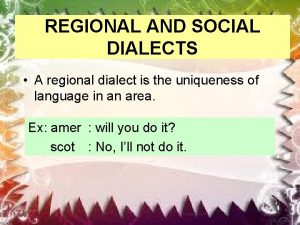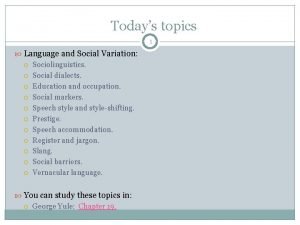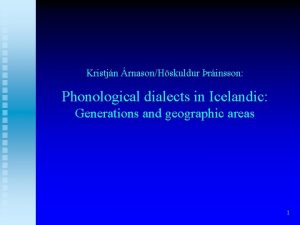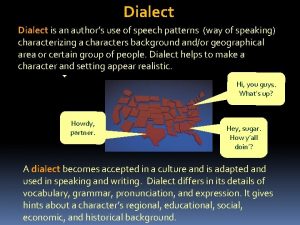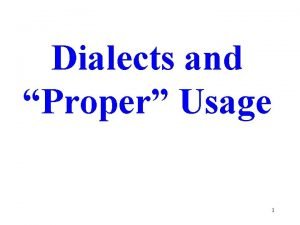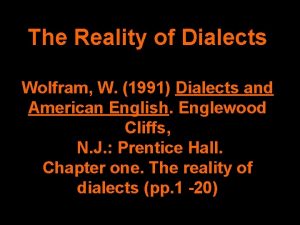Sociolinguistics LECTURE24 Sociolinguistics Introduction to sociolinguistics Different dialects







- Slides: 7

Sociolinguistics LECTURE#24

Sociolinguistics • • • Introduction to sociolinguistics Different dialects Varieties of dialects Grammatical accuracy Different language community Language vocabulary

Sociolinguistics § • • A detailed explanation The exotic character of language The familiar language Language communities Language in relation to society

Sociolinguistics • However, everyday use of Alsatian is a strong marker of local identity; it is an important part of being Alsatian in France. • We can contrast this situation with that in another area of France. • In Brittany a separatist movement, that is, a movement for local autonomy if not complete independence, is centered on Breton, a language which, unfortunately for those who speak it, is in serious decline. • Breton identity no longer has the support of widespread use of the language.

Sociolinguistics • The various relationships among languages and dialects discussed above can be used to show the concepts of ‘power’ and ‘solidarity’ help us understand what is happening. • Power requires some kind of asymmetrical relationship between entities: one has more of something that is important, e. g. status, money, influence, etc. , than the other or others. • A language has more power than any of its dialects. • It is the powerful dialect but it has become so because of non-linguistic factors.

Sociolinguistics • Standard English and Parisian French are good examples. • Solidarity, on the other hand, is a feeling of equality that people have with one another. • They have a common interest around which they will bond. • A feeling of solidarity can lead people to preserve a local dialect or an endangered language to resist power, or to insist on independence. • It accounts for the persistence of local dialects, the modernization of Hebrew, and the separation of Serbo. Croatian into Serbian and Croatian.

Sociolinguistics • The language–dialect situation along the border between the Netherlands and • Germany is an interesting one. • Historically, there was a continuum of dialects of one language, but the two that eventually became standardized as the languages of the Netherlands and Germany, Standard Dutch and Standard German, are not mutually intelligible, that is, a speaker of one cannot understand a speaker of the other. • In the border area speakers of the local varieties of Dutch and German still exist within that dialect continuum and remain largely intelligible to one another, yet the people on one side of the border say they speak a variety of Dutch and those on the other side say they speak a variety of German.
